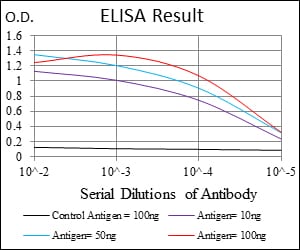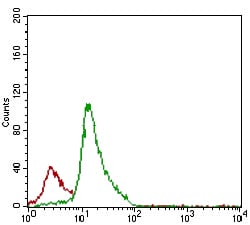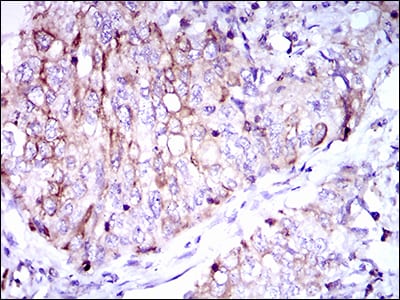


| WB | 咨询技术 | Human,Mouse,Rat |
| IF | 咨询技术 | Human,Mouse,Rat |
| IHC | 1/200 - 1/1000 | Human,Mouse,Rat |
| ICC | 技术咨询 | Human,Mouse,Rat |
| FCM | 1/200 - 1/400 | Human,Mouse,Rat |
| Elisa | 1/10000 | Human,Mouse,Rat |
| Aliases | GP40; TP41; Tp40; LEU-9 |
| Entrez GeneID | 924 |
| clone | 4D4F8 |
| WB Predicted band size | 25.4kDa |
| Host/Isotype | Mouse IgG1 |
| Antibody Type | Primary antibody |
| Storage | Store at 4°C short term. Aliquot and store at -20°C long term. Avoid freeze/thaw cycles. |
| Species Reactivity | Human |
| Immunogen | Purified recombinant fragment of human CD7 (AA: 72-175) expressed in E. Coli. |
| Formulation | Purified antibody in PBS with 0.05% sodium azide |
+ +
以下是3篇关于CD7抗体的代表性文献及其摘要内容:
1. **"Targeting CD7 in T-cell acute lymphoblastic leukemia using CAR T cells"**
- **作者**: Gomes-Silva D, et al.
- **摘要**: 研究开发了靶向CD7的CAR-T细胞疗法,用于治疗复发/难治性T细胞急性淋巴细胞白血病(T-ALL)。通过基因编辑技术敲除CAR-T细胞自身的CD7以避免自相残杀,实验显示该疗法在体外和小鼠模型中显著抑制肿瘤生长。
2. **"CD7 is a prognostic marker and potential therapeutic target in acute myeloid leukemia"**
- **作者**: Zhang Y, et al.
- **摘要**: 该文献发现CD7在部分急性髓系白血病(AML)患者中异常表达,并与不良预后相关。通过体外实验验证CD7抗体偶联药物(ADC)可特异性杀伤CD7阳性AML细胞,提示CD7可能成为AML的潜在治疗靶点。
3. **"Anti-CD7 monoclonal antibody-based immunotherapy for T-cell malignancies"**
- **作者**: Huang R, et al.
- **摘要**: 研究评估了一种新型抗CD7单克隆抗体(mAb)在T细胞恶性肿瘤中的疗效。该抗体通过抗体依赖性细胞毒性(ADCC)和补体依赖性细胞毒性(CDC)作用清除CD7阳性肿瘤细胞,并在临床前模型中显示出显著抗肿瘤活性。
4. **"CD7 expression in normal and neoplastic tissues: implications for antibody-based therapy"**
- **作者**: Campana D, et al.
- **摘要**: 系统分析了CD7在正常组织和肿瘤组织中的表达分布,强调其在T细胞恶性肿瘤中的高特异性。研究提出基于CD7抗体的免疫毒素或双特异性抗体可能减少对正常组织的毒性,为精准治疗提供依据。
以上文献涵盖了CD7抗体在诊断、预后评估及CAR-T、ADC等治疗方向的应用研究。
CD7 antibody targets the CD7 glycoprotein, a cell surface antigen primarily expressed on T cells and natural killer (NK) cells. Discovered in the 1980s, CD7 is a 40 kDa transmembrane protein belonging to the immunoglobulin superfamily. Its physiological role remains incompletely understood but is implicated in T-cell activation, adhesion, and apoptosis regulation. Aberrant CD7 expression is observed in T-cell malignancies, such as T-cell acute lymphoblastic leukemia (T-ALL) and peripheral T-cell lymphomas, making it a diagnostic and therapeutic marker.
CD7 antibodies have been developed for both diagnostic and therapeutic applications. In diagnostics, they aid in immunophenotyping leukemia/lymphoma via flow cytometry, distinguishing T-cell neoplasms from other hematologic malignancies. Therapeutically, anti-CD7 antibodies are explored in immunotherapy due to their potential to target malignant T cells. However, challenges arise because CD7 is also expressed on normal T cells, risking systemic immunosuppression. Strategies to mitigate this include antibody-drug conjugates (ADCs), bispecific antibodies, or gene-edited CAR-T cells lacking CD7 to avoid fratricide.
Recent advances include CD7-directed CAR-T therapies and antibody-based agents in clinical trials for relapsed/refractory T-cell malignancies. For example, humanized anti-CD7 monoclonal antibodies (e.g., A3D8. WT1) are under investigation. Additionally, CD7 antibodies are studied in autoimmune diseases to modulate pathogenic T-cell activity. Despite progress, optimizing specificity and reducing off-target effects remain critical hurdles. Research continues to refine CD7-targeted approaches, balancing efficacy with safety in treating T-cell-driven diseases.
×